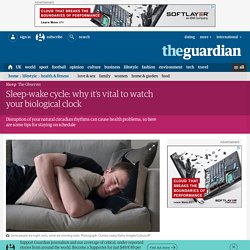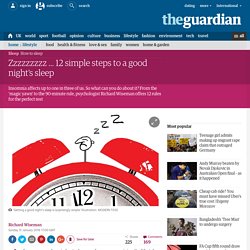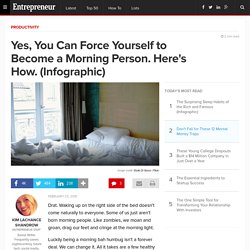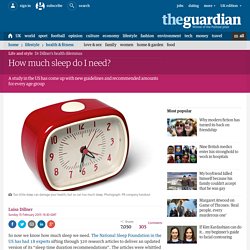

Insomnia quiz: How much do you know about sleeplessness? Sleep-wake cycle: why it’s vital to watch your biological clock. Breakfast in the morning, work during the day, relaxation in the evening followed by bedtime.

The waking hours have a certain rhythm, and the 24-hour cycle of the Earth’s rotation has resulted in a human sleeping pattern that largely takes place at night for about seven or eight hours of continuous shut-eye. Several studies have found that disturbing this ancient sleep-wake cycle can make people more prone to illnesses such as diabetes, obesity, gastrointestinal disorders and heart disease. Now, a study on nearly 300 pensioners at 24 GP practices in England has found that the best time to have a flu jab is probably in the morning, as this is the time when the immune systems of older people are better able to produce virus-fighting antibodies. Scientists believe that up to 2,400 lives might be saved if all winter flu jabs were given to older patients before noon, as this is the time when their immune defences are at their best.
Does disturbing the circadian rhythm cause health problems? Clickbait: The changing face of online journalism. Image copyright Screengrab/Walesonline It is a golden rule of journalism, taught to any news reporter at the beginning of their career - your introduction should grab the reader straight away.

If you cannot hold someone's attention for a sentence, you have no hope of getting them to read the rest of your article. The same is true for headlines; stark, witty or intriguing ones can draw the reader's eye to a story. Headline writing has long been considered a skill but, in the digital age, a new word has become synonymous with online journalism - clickbait. Put simply, it is a headline which tempts the reader to click on the link to the story. Publishers increasingly use it for simple economics; the more clicks you get, the more people on your site, the more you can charge for advertising. A report by the Columbia Journalism Review highlighted the case of online magazine Slant, which pays writers $100 per month, plus $5 for every 500 clicks on their stories.
Image copyright Damian Radcliffe. Zzzzzzzzz … 12 simple steps to a good night’s sleep. A few years ago, I carried out a large-scale survey examining the lifestyles of people who sleep well and wake up feeling refreshed.

The results revealed that the secret of a great night’s sleep is surprisingly simple, and comes down to the following 12 techniques. 1 Avoid the blues When your eyes are exposed to light, your brain produces less of the sleep-inducing hormone melatonin. Light towards the blue end of the spectrum is especially stimulating and, unfortunately, computer screens, tablets, smartphones and LED lighting all emit a lot of blue light. Try not to use these devices in the two hours before you go to bed. 2 Tub time There’s a decrease in your body temperature just before you fall asleep. 3 Steer clear of the nightcap Although a small amount of alcohol might help you get to sleep more quickly, it also gives you a more disturbed night, increases the chances of snoring and disrupts dreaming. 4 Follow the 90-minute rule 5 Distract your brain.
Yes, You Can Force Yourself to Become a Morning Person. Here's How. (Infographic) Drat.

Waking up on the right side of the bed doesn’t come naturally to everyone. Some of us just aren’t born morning people. Like zombies, we moan and groan, drag our feet and cringe at the morning light. Luckily being a morning bah humbug isn’t a forever deal. We can change it. Related: 5 Morning Ritutals to Keep You Productive All Day Long Here are a few changes you can make to turn yourself into that shiny, happy morning glory you always wanted to be: Don’t hit the snooze button. Related: 7 Ways to Take Your Sleep Back For more tips and tricks to help you morph into a morning person, check out the fact-filled infographic below compiled by the perky people over at Greatist, citing data from the National Institutes of Health.
Click to Enlarge Related: A 9-Step Framework for Creating a Morning Ritual. How much sleep do I need? So now we know how much sleep we need.

The National Sleep Foundation in the US has had 18 experts sifting through 320 research articles to deliver an updated version of its “sleep time duration recommendations”. The articles were whittled down from an original 2,412 on the basis of the strength of the studies. In making their recommendations, the experts took into account the health benefits, but also the risks, associated with sleep. Too little sleep over several nights leaves you tired, unable to concentrate, depressed, anxious and, eventually, if it continues, at an increased risk of diabetes, high blood pressure and obesity. Too much sleep is associated with much the same problems. Famous Nappers Slideshow - Celebrities and Politicians Known for Taking a Nap. Video Page. Naps, sleep apnea, the right mattress.
Headline vocabulary. Emojinews. Try this ESL Lesson Matching Newspaper Headlines. Parts of a Newspaper.